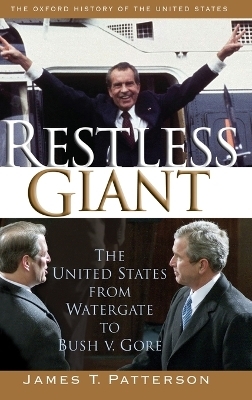
Restless Giant
The United States from Watergate to Bush v. Gore
Seiten
2005
Oxford University Press Inc (Verlag)
978-0-19-512216-9 (ISBN)
Oxford University Press Inc (Verlag)
978-0-19-512216-9 (ISBN)
Restless Giant is a magisterial interpretation of American history between 1974, when the Watergate crisis imperiled the nation, and November 2000, when the bitterly contested presidential election marked an all-time low in confidence in the electoral process.
Restless Giant is a magisterial interpretation of American history between 1974, when the crisis of Watergate imperiled the nation, and November 2000, when the bitterly contested presidential election marked an all-time low in confidence in the electoral process. James T. Patterson, whose earlier contribution to the Oxford History of the United States, Grand Expectations (1996), won a Bancroft Prize for History, offers in this follow-up volume a vivid narrative of this quarter century which did so much to shape American life today. A host of memorable characters, notably Ronald Reagan and Bill Clinton, sought to transform the nation. Conservatives, including a resurgent Religious Right, battled liberals in 'culture wars' that appeared to cut the country in two. The frightening Cold War finally ended, whereupon Americans faced bewildering new developments in international relations. Though a military colossus, the United States discovered-in Panama, Somalia, Bosnia, Iraq-that it was far from easy to direct the outcome of overseas events. Restless Giant explores a wide range of cultural, social, and economic concerns. Many of these-abiding racial tensions, rising income inequality, dismal inner-city schools, tasteless popular entertainment, an ever more exuberant materialism-drove critics to label these years as an 'Era of Conflict', an 'Age of Limits', and an 'Era of Decline'. Patterson, highlighting the buoyancy of American culture, is not so pessimistic. The economy, having wallowed in 'stagflation' between 1974 and 1982, later surged ahead. By 2000, most Americans lived far more comfortably than they had in the 1970s. Thanks to rising tolerance and a powerful rights consciousness, many groups-racial and ethnic minorities, Catholics and Jews, women, the handicapped, senior citizens, gay people-encountered considerably less bigotry and discrimination than they had in the past.
Restless Giant is a magisterial interpretation of American history between 1974, when the crisis of Watergate imperiled the nation, and November 2000, when the bitterly contested presidential election marked an all-time low in confidence in the electoral process. James T. Patterson, whose earlier contribution to the Oxford History of the United States, Grand Expectations (1996), won a Bancroft Prize for History, offers in this follow-up volume a vivid narrative of this quarter century which did so much to shape American life today. A host of memorable characters, notably Ronald Reagan and Bill Clinton, sought to transform the nation. Conservatives, including a resurgent Religious Right, battled liberals in 'culture wars' that appeared to cut the country in two. The frightening Cold War finally ended, whereupon Americans faced bewildering new developments in international relations. Though a military colossus, the United States discovered-in Panama, Somalia, Bosnia, Iraq-that it was far from easy to direct the outcome of overseas events. Restless Giant explores a wide range of cultural, social, and economic concerns. Many of these-abiding racial tensions, rising income inequality, dismal inner-city schools, tasteless popular entertainment, an ever more exuberant materialism-drove critics to label these years as an 'Era of Conflict', an 'Age of Limits', and an 'Era of Decline'. Patterson, highlighting the buoyancy of American culture, is not so pessimistic. The economy, having wallowed in 'stagflation' between 1974 and 1982, later surged ahead. By 2000, most Americans lived far more comfortably than they had in the 1970s. Thanks to rising tolerance and a powerful rights consciousness, many groups-racial and ethnic minorities, Catholics and Jews, women, the handicapped, senior citizens, gay people-encountered considerably less bigotry and discrimination than they had in the past.
James T. Patterson is the author of Grand Expectations: The United States 1945-1974, for which he won the Bancroft Prize in history, and numerous other books, including Brown V. Board: A Civil Rights Milestone and Its Troubled Legacy. He was Ford Foundation Professor of History (Emeritus) at Brown University and the recipient of numerous fellowships and honors, including the Harmsworth professorship at the University of Oxford.
| Erscheint lt. Verlag | 24.10.2005 |
|---|---|
| Reihe/Serie | The Oxford History of the United States |
| Zusatzinfo | 32 pp halftone plates |
| Verlagsort | New York |
| Sprache | englisch |
| Maße | 236 x 152 mm |
| Gewicht | 850 g |
| Themenwelt | Geschichte ► Allgemeine Geschichte ► Zeitgeschichte |
| Geisteswissenschaften ► Geschichte ► Regional- / Ländergeschichte | |
| ISBN-10 | 0-19-512216-X / 019512216X |
| ISBN-13 | 978-0-19-512216-9 / 9780195122169 |
| Zustand | Neuware |
| Informationen gemäß Produktsicherheitsverordnung (GPSR) | |
| Haben Sie eine Frage zum Produkt? |
Mehr entdecken
aus dem Bereich
aus dem Bereich
Schulbuch Klassen 7/8 (G9)
Buch | Hardcover (2015)
Klett (Verlag)
31,50 €
Buch | Softcover (2004)
Cornelsen Verlag
25,99 €


